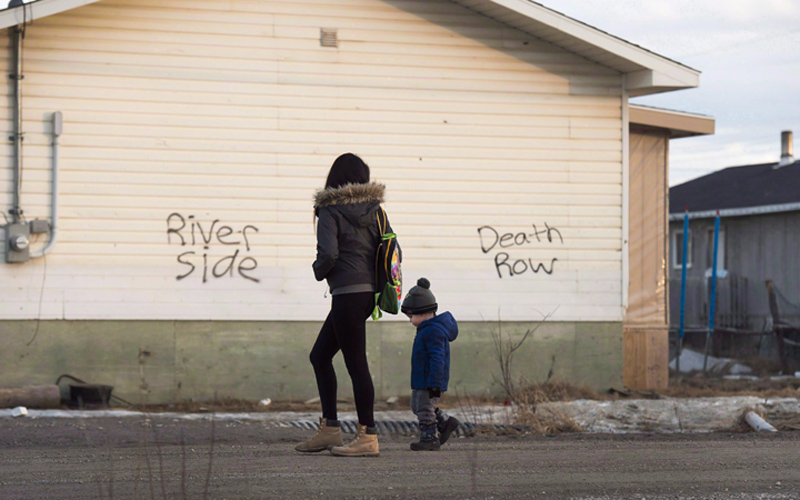OTTAWA – Health Canada makes some on-reserve patients jump through hoops or wait longer than non-indigenous Canadians to access prescription drugs their doctors believe they need to treat mental illnesses, a psychiatrist who has worked in First Nations communities says.

Dr. Cornelia Wieman, who spent eight years as a community-based psychiatrist at Six Nations of the Grand River Territory, a reserve near Brantford, Ont., said some prescriptions used to treat severe mental illnesses are not covered by Health Canada unless the patient has tried other antipsychotic agents first and experienced no improvement or suffered adverse reactions.
“I would often have to try the older versions of medications that according to the clinical practice guidelines were out of date, and I would have to have a patient fail on those older medications before they received funding for newer medications that were available on the market,” Wieman, a psychiatrist at the Centre for Addictions and Mental Health in Toronto, told the parliamentary committee studying the high suicide rate in indigenous communities.
READ MORE: Ottawa slammed on First Nations funding for child welfare, suicide prevention
The issue is linked to Health Canada’s non-insured health benefits program which provides about $1 billion in annual coverage to eligible First Nations and Inuit people for a limited range of prescription drugs, dental care, vision care, medical supplies and equipment, medical transportation and mental health counselling not covered by private or provincial or territorial health insurance plans.
The drugs benefit list includes four antipsychotic drugs that can be used only under limited conditions and require pre-approval from Health Canada. All four of them, however, are covered under general benefits in the Ontario drug plan.
- Capital gains changes are ‘really fair,’ Freeland says, as doctors cry foul
- Ontario doctors offer solutions to help address shortage of family physicians
- ‘Dangerous message’: Experts slam anti-sunscreen claims circulating online
- ‘Trying not to die’: Tourism operators loaded with debt despite rising demand
Wieman said when it comes to remote indigenous communities, their chances to see a psychiatrist are often few and far between.
“That may be the one and only time I am in contact with that patient for, say, the next six months or a year or even more,” she said in an interview.
That means it could take even longer for the patient to finally get approved for the medication the doctor wanted to prescribe in the first place.
“I think there is this extra layer that First Nations and Inuit people, who are funded under non-insured health benefits, may have to go through in order to get the treatment that they require that would be equivalent to the standard of care that we provide in urban settings and that’s an inequality,” said Wieman, the first indigenous woman to become a psychiatrist in Canada.
READ MORE: Urgent action needed to curb chronic diseases in First Nation communities: Cancer Care Ontario
Yvonne Jones, the parliamentary secretary to Indigenous Affairs Minister Carolyn Bennett, told The Canadian Press earlier this year that the Liberal government is aware of the issues with the non-insured health benefits program and is considering reform.
A spokesperson from Health Canada was unavailable for comment.
Another problem, said Dr. Alika Lafontaine, president of the Indigenous Physicians Association of Canada, is that it takes the decision-making power away from clinicians.
“Fiscal restraint should never be an excuse for non-patient-centred care,” said Lafontaine.
Wieman said as frustrating as the obstacles to prescription medication can be, she thinks the even bigger problem is how comparatively little money goes to counselling.
The 2014-2015 report on the non-insured health benefits program shows that 41 per cent of the $1 billion spent that year went to pharmacy claims, compared to just 1.5 per cent to mental health. The program covers up to 20 one-hour sessions, following an initial assessment.
In response to an order paper question, which is like an access-to-information request for MPs, Health Canada said that only two per cent of pharmacy claims are subject to pre-approval, meaning the department asks for “additional information to confirm that certain criteria are met before providing coverage.”
READ MORE:Prime Minister Justin Trudeau announces $69M for indigenous mental health services
Dr. Michael Kirlew, a family doctor who works in indigenous communities surrounding Sioux Lookout, Ont., pointed out that some of the drugs requiring prior approval are commonly used to treat things like asthma or heart disease and that patients and their pharmacists have to deal with paperwork – and delays – that non-indigenous Canadians do not.
“The standard of health care that people receive is far inferior to what other people get and this is just another example of that,” Kirlew said.
“The system is not equal,” he said.



Comments